If you manage or direct SEO, PPC, content marketing, or social media marketing for an organization in the travel industry, then you already know how hard hotels, airlines, cruise lines, tourism destinations, and online travel agencies (OTAs) have been hit by the coronavirus pandemic.
Bad news travels fast.
To stay on top of the outbreak’s impact on the business of travel, I subscribe to the Skift Daily Newsletter. Recent headlines have read:
- Google Travel Search Is Unrecognizable as Advertising Dries Up
- Business Travel Sector to Take a $820 Billion Virus-Related Revenue Hit: Survey
- Hotels and Airports See Jaw-Dropping Declines in Foot Traffic in March
- Coronavirus, Olympics Delay Batter Japanese Hotel Business
- Tightening Coronavirus Curbs Sap Travel Demand Through Airline Hubs
- Dire Case for Airlines Laid Out by Industry Trade Group
- How Much Damage Will Coronavirus Do to Cruise Industry?
- 10 Cruise Ships Are Still Unable to Dock as Ports Fear Coronavirus
- California’s Visitor Economy Disappears as Shelter in Place Takes Hold
- Spain’s Tourism Sector Faces Three Concurrent Crises
So, you don’t need to be Captain Obvious to realize that it will take “a while” before the travel business begins to recover.
As a matter of fact, even the Hotels.com mascot is going to be socially distancing for “a while.” And you should, too.
So, Just How Long Is a While?
Well, Travelandmobility.tech recently published an article by Kolin Schunck entitled How long will the coronavirus torture the travel industry?
The bi-weekly newsletter, which is written by current or former employees of the Lufthansa Innovation Hub, ran an unconventional data analysis that managers and directors in SEO, PPC, content marketing, or social media marketing, as well as executives in digital marketing, will want to read for themselves.
Schunck and his colleagues looked at Chinese app-download trends across the major categories in travel and mobility tech, including:
- Air travel.
- Online search and booking.
- Accommodations (hotels and apartments).
- Urban mobility (bike-, car- and ride-sharing).
- Tours and activities.
For each sector, they selected the top five mobile apps based on app download volumes within the last 12 weeks in China.
They then calculated the week-over-week change in app downloads and smoothed the trend lines by using a two-week moving average.
The results are eye-opening and provide a much-needed answer to the question: “How long it will take the travel industry to overcome the COVID-19 pandemic?”
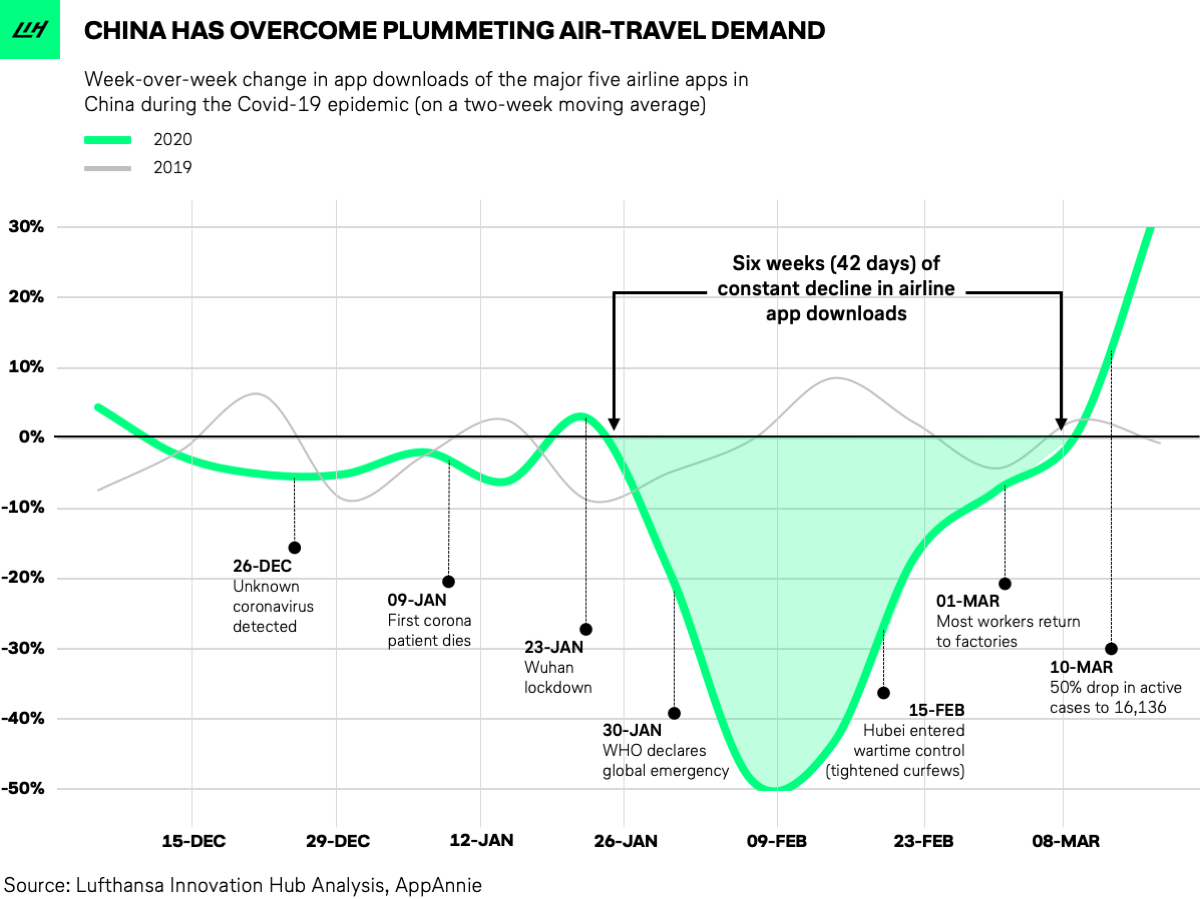
As you can see from the image above, which the Lufthansa Innovation Hub has given its permission to share, China started to overcome plummeting air-travel demand six weeks (42 days) after the Wuhan lockdown.
Using the same methodology, Schunck and his colleagues also looked at data from the five most downloaded mobile apps for search and booking platforms, bike-sharing, ride-hailing, car-sharing, accommodations, as well as tours and activities.
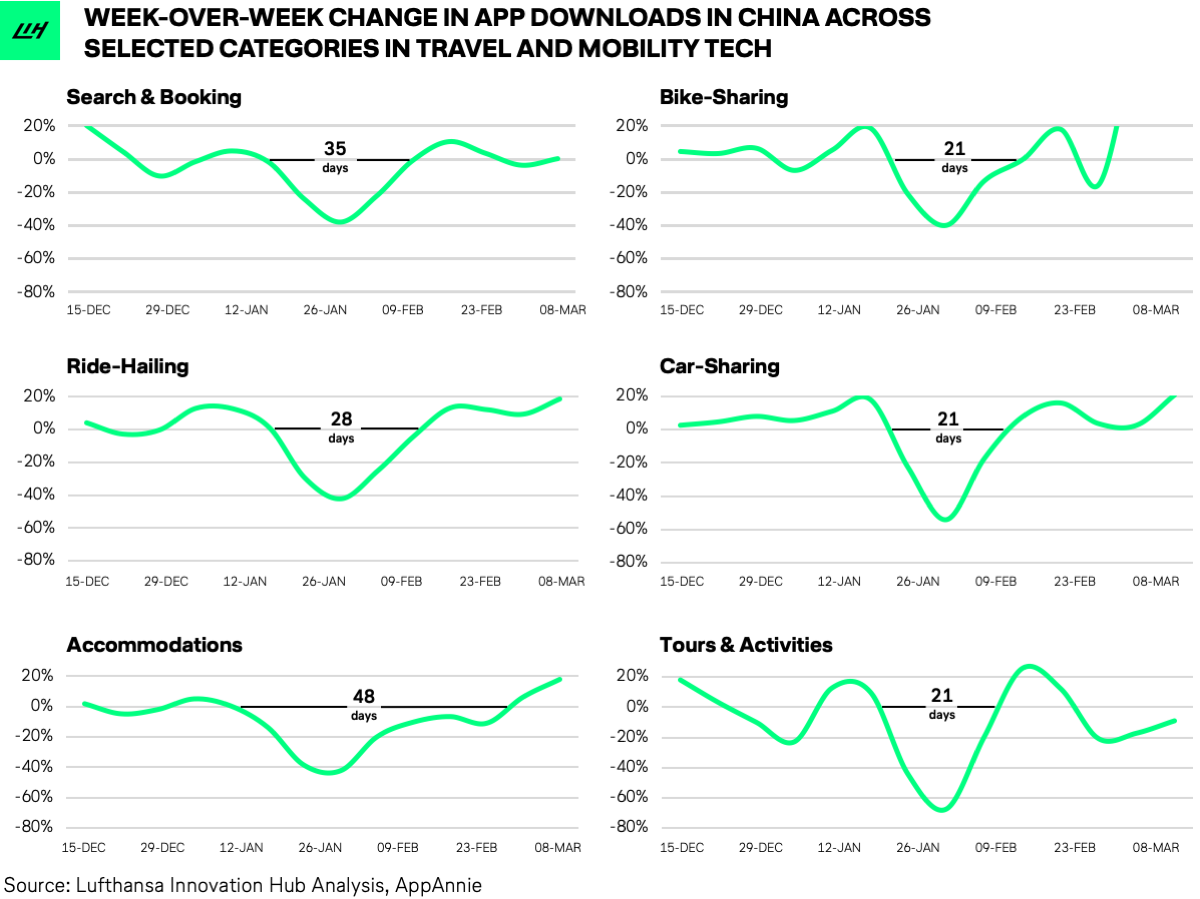
As you can see in the image above, there is a V-shaped curve in each of these categories – although the depth and duration vary by category:
- 21 days for bike-sharing, car-sharing, as well as tours and activities.
- 48 days for accommodations.
Based on this analysis, Schunck and his colleagues said:
“We expect to see similar trends in the West, depending on how effective current measures are at reducing the spread of Covid-19. Of course, it’s safe to assume that the recovery time might take longer in the Western hemisphere, given the drastic measures taken by the Chinese government to contain Covid-19. While these measures are harder to implement in American and European democracies, we still believe the six-week recovery time is a reasonable benchmark.”
Now, I don’t want to give you false hope.
The Lufthansa Innovation Hub’s benchmark presumes that travel bans are strictly maintained so that the spread of the novel coronavirus is effectively controlled.
This may be a logical assumption in Germany, where early and persistent testing help helped to keep the fatality rate from coronavirus relatively low.
But it may be overly optimistic in the United States, where the absence of robust screening until it was “far too late” let COVID-19 spread undetected for weeks.
So, I contacted a number of industry sources over the weekend, and one executive at an international digital marketing agency with clients in the tourism and hospitality industries – who didn’t want to be quoted by name – told me:
“We have seen data from multiple sources suggesting that Asia in general is moving forwards – especially China. And we’ve also seen data that Italy – believe it or not – is beginning to slowly wake-up. So, some travel clients have realized they have to get re-involved early or they’ll find their market share trashed.”
And over the weekend, Ezekiel Emanuel, a health policy expert and vice-provost of the University of Pennsylvania, suggested that lockdowns could ease up in June.
Emanuel outlined his road map in an opinion piece in The New York Times – We Can Safely Restart the Economy in June. Here’s How.
Based on China’s response to the virus, he suggested that a national shelter-in-place order over the next eight to 10 weeks, excluding essential services workers, should, bring transmission of the virus way down.
So, for argument’s sake, let’s say it takes another eight to 10 weeks – from now until early June – before the travel industry begins to recover from the “rational panic” caused by the coronavirus pandemic.
This may turn out to be an optimistic estimate, but this glimmer of “rational hope” enables digital marketers in the travel industry to start planning for the best-case scenario.
Hey, most of them finished their plans for the worst-case scenario two weeks ago, so they’ve got that contingency covered.
This also enables us to look for, evaluate, and recognize some of the heroic efforts by digital marketers at hotels, airlines, cruise lines, tourism destinations, and OTAs.
These are the people who lit a candle and placed it in the window as a beacon to weary travelers.
How the Industry Is Responding
Marriott International
For example, kudos to Marriott Hotels and Resorts for shining window lights at night with messages of hope for local communities and the entire nation.
See an example of the #MarriottStrong campaign below, which was provided by Marriott Hotels.
Hospitality comes from the heart. ❤️
See what some @marriottintl hotels did—unplanned!
Thank you all for being a light in our industry & in our community. #MarriottStrong
So proud to stand next to you all & call myself a #hotelier!⠀#HotelsofHope #marriottamericas #COVID19 pic.twitter.com/MXHWTIyDpQ— Sarah Dandashy (@AskAConcierge) March 27, 2020
American Hotel and Lodging Association
And kudos to the American Hotel and Lodging Association (AHLA) for identifying over 6,500 hotel properties across the U.S. that are near health care facilities and available to house health care workers and other first responders.
The AHLA represents every segment of the hotel industry including major chains, independent hotels, management companies, REIT’s, as well as bed and breakfasts.
Chip Rogers, AHLA president and CEO, said in a statement, “The hotel industry is uniquely positioned to support and help strengthen our communities and first responders who are on the frontlines of dealing with this ongoing public health crisis.”
He added, “Hotels have always been an active member of our local communities, and this time is no different.”
The AHLA is dubbing the effort “Hotels for Hope” and is working with local, state and federal governments to create a database of locations available for use.
Click Travel
Kudos to Click Travel, a UK-based corporate travel agency that is urging hotels to call them before shutting down.
Why?
Because crisis workers – including doctors, nurses, and police officers – are exempt from the latest travel restrictions.
And, they are only now requesting block bookings over the next eight weeks.
In an article, UK Hotels Get a Little Lift From Block Bookings for Crisis Workers, Jill Palmer, the CEO of Click Travel, recently told Matthew Parsons of Skift:
“If every Travelodge and Premier Inn is closed, I don’t know where these key workers are going to stay. There has to be some give and take. I know some hotels are staying open for key workers, and doing what they can to support them, but it does present a challenge for us.”
Nevertheless, the agency recently sourced 13,360 hotel nights for its clients, including the UK’s National Health Service and police force.
Visit Portugal
And kudos to Visit Portugal’s Can’t Skip Hope video for hitting the right note in a crisis.
A decidedly uplifting campaign, the video tackles the issue of travel bans head-on its first few words: “It’s time to stop.”
The sweeping vistas and charming scenes displayed in the two-minute video certainly inspire one to visit Portugal in the future, but it doesn’t come across as sales-y.
The “we-are-in-this-together” tone feels rationally hopeful in these trying times.
Southwest Airlines
Kudos to Southwest Airlines for creating The Southwest Airlines Community to keep its customers updated and for uploading videos like CEO Gary Kelly Gives Update on Business Impact and Government Relief Regarding COVID-19.
It enables customers and stakeholders to see and hear the Chairman of the Board and Chief Executive Officer of Southwest Airlines discuss:
- His thoughts on doing business during this unprecedented time.
- The work their senior leaders are doing to determine how to best navigate the impact of the pandemic.
- The pending legislation to provide much-needed relief to the country and airline industry.
And kudos to Linda Rutherford, the Chief Communications Officer of Southwest Airlines, for adding updates like CEO Gary Kelly Discusses Southwest’s Commitment to Customers and Social Distancing Efforts when things change a few days later.
She recognizes that communication early and often is one of the best practices in a crisis.
Kudos to an Atlanta ramp agent for Southwest Airlines, who posted a photo to Instagram showing health care workers headed for New York City to help.
The photo was taken before the plane pushed back from the gate and shows all of those aboard the flight – including other passengers and the flight crew – making hearts with their hands.
Tripadvisor
And kudos to Tripadvisor for creating information about traveling in these times as well as changing their policies for users regarding cancellations.
In addition, their CEO and cofounder, Steve Kaufer, is also foregoing his salary for the year to help the company.
Jet2
Kudos to Jet2.com’s “What are you looking forward to?” email marketing campaign.
It says: “Getaways might be on hold right now, but we can still daydream. So what are you most looking forward to when you jet away?”
And the email that I saw showed how other recipients had voted:
- 53% beach lazing.
- 15% uncovering culture.
- 12% cuisine tasting.
- 8% getting active.
- 8% experiencing nightlife.
- 4% souvenir shopping.
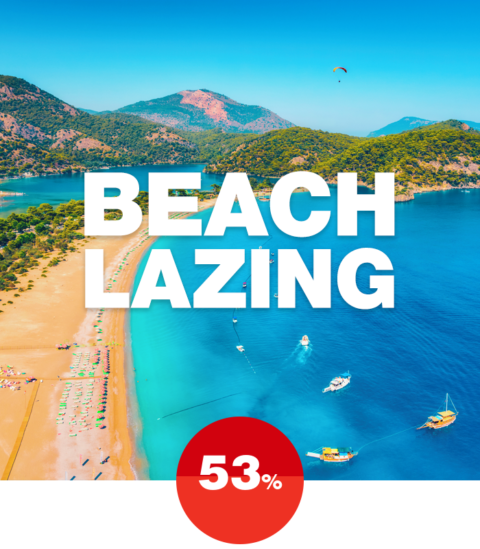
Travelzoo
And kudos to Travelzoo for replacing its regular Top 20 Travel Deals email with one that opened with a subject line reflecting what many people felt – A Week Like No Other.
In the body of the email, Travelzoo’s general manager says:
“I have asked my team not to publish our Top 20 this week, and put our passion for travel aside to support our government in its efforts to contain the virus by staying at home.”
She then points out a few new policies that will help consumers confidently pursue their passion for travel once they are able to venture out and about again:
“Going forward, almost all offers we tell you about will be either fully refundable or can be changed without penalties. We will state this clearly for every offer to put your mind at ease. We’ve even created a new set of offers: You don’t have to pick travel dates when you buy them, and they are 100% refundable, no questions asked.”
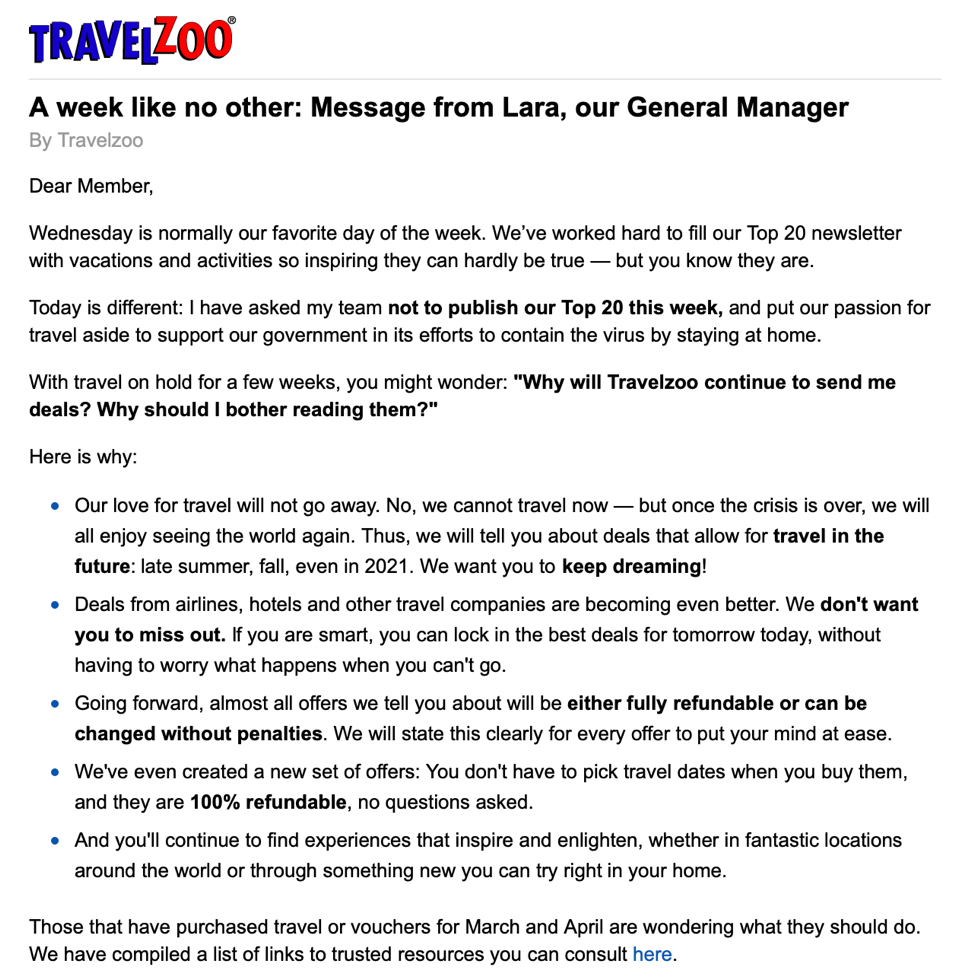
MullenLowe
Kudos to MullenLowe, a Boston-based full service integrated advertising agency for focusing on changing its own mindset from advertising to strategy.
Some of the ad agency’s clients – including JetBlue and Royal Caribbean – were among the first companies to be upended by the global shutdown.
And in response, Kelly Fredrickson, the President of MullenLowe, gave clients a new kind of advice:
“You can’t advertise out of a crisis. You can focus on what you’re doing for your customers.”
According to a roundup story Jon Chesto and Shirley Leung of The Boston Globe, Here’s how local CEOs and business leaders acted as the coronavirus crisis spread, Fredrickson also told clients to be “mindful of their place and role in their customers’ lives,” and adjust their messaging accordingly – helping JetBlue, for example, use its social media channels to quickly respond to customers madly scrambling to make or adjust flights as the pandemic spread rapidly.
“Most consumers don’t mind hearing from brands as long as it is a solution,” Fredrickson said, “where we are not trying to sell something, but we are trying to solve something.”
WebCertain
And kudos to WebCertain, which provides international SEO, international PPC, global social media, and translation services, for offering its ad design services to hotel companies for free to try and help them out in this crisis.
Andy Atkins-Kruger, Group CEO at WebCertain, told me over the weekend:
“Just to give you a feeling for the situation – my team has had clients on meetings and calls in floods of tears.”
But, he adds:
“I’m absolutely convinced that travel will bounce back faster than anyone believes. I believe that consumers will surprise us with an urgent desire to get back to travel and will be prepared to pay for it. Many see their annual holiday as a right and a necessity to keep their lives on track – and they’re not going to forgo that for anyone. But they will be looking for changes. Hotel rooms that are certified disinfected after each previous visitor. Restaurants with more separation between tables. Plenty of space for their families to stay safe some distance from others. Room based entertainment that exceeds the norm. And they’ll expect to see all this in the description of the holiday. And then, they’ll go for it big style.”
Ava Roxanne Stritt
Kudos to travel writer Ava Roxanne Stritt, who has been called the most influential person in the world for spa travel and also a top authority on luxury travel, for working with multiple brands and public relations agencies to get appropriate content out about their clients with themes of healthy recipes and self-care.
A contributor to Travelocity, LA Travel Magazine, Upscale Living Magazine, USA Today, Spa Inc., and TripAdvisor, Stritt says:
“Just because you’re spending more time at home, doesn’t mean you have to miss out on your favorite cuisine from around the globe!”
Marco Scavia
I also sent an email to Marco Scavia, an ecommerce consultant at STORE360 in Genoa, Italy.
Although the United States has the most confirmed coronavirus cases, Italy has the most deaths.
That’s why Scavia deserves kudos for sharing his personal thoughts “about this crazy situation and how we feel about it in Italy.”
The Globalization of Trust
“We are living completely new days for most current generations. Fear, lack of certainties, insecurity about the future, weigh globally on the entire world population. At the same time, there is a great desire to forget this period and move on, trying to quickly return to the pre-pandemic period.
“But we know that it will not be the same for quite some time, a situation like this is not easily forgotten.
“It’s time for new challenges: how will companies win back their customers? How will the tourism sector (today “perhaps” our last priority) regain market share?
“Mine is only a thought as a tourist and not as an operator: but what I would expect is a ‘globalization of trust’. Airlines, hotels, museums and any other type of destination must rebuild customer confidence.
“Tourism should give us both fun and new experiences, new points of observation and reflection; exploration and discovery are primary human needs. But if we put aside the category of great explorers, how can we give back the desire to travel to normal people? By offering them a private jet and stays in individual suites of 1,000 square meters? Exciting, but over budget.
“Once the emergency is over, most likely at the beginning there will be more push towards local tourism (in Italy we are certainly favored and we can plan high quality tourism within the country itself). But trust has no boundaries. And it must be reconstructed with an action of collaboration and comparison at every level: from the big companies to the smallest Airbnb.
“A diversified offer that no longer sells only dreams but security and support, from departure to return home. A great opportunity to create a quality tourism network that supports travelers with a new awareness of safety.
“Collaboration, sharing information and joining efforts for common goals, have perhaps never been as essential as they are today. Yes, we can. :)”
More Resources:
- Working with SEO Clients: Strategies for Now & After COVID-19
- 7 Ways COVID-19 Is Affecting Search Traffic & How SEOs Can Respond
- 5 Completely Sane Reasons Why You Shouldn’t Stop SEO Efforts During COVID-19
Image Credits
All screenshots taken by author, March 2020

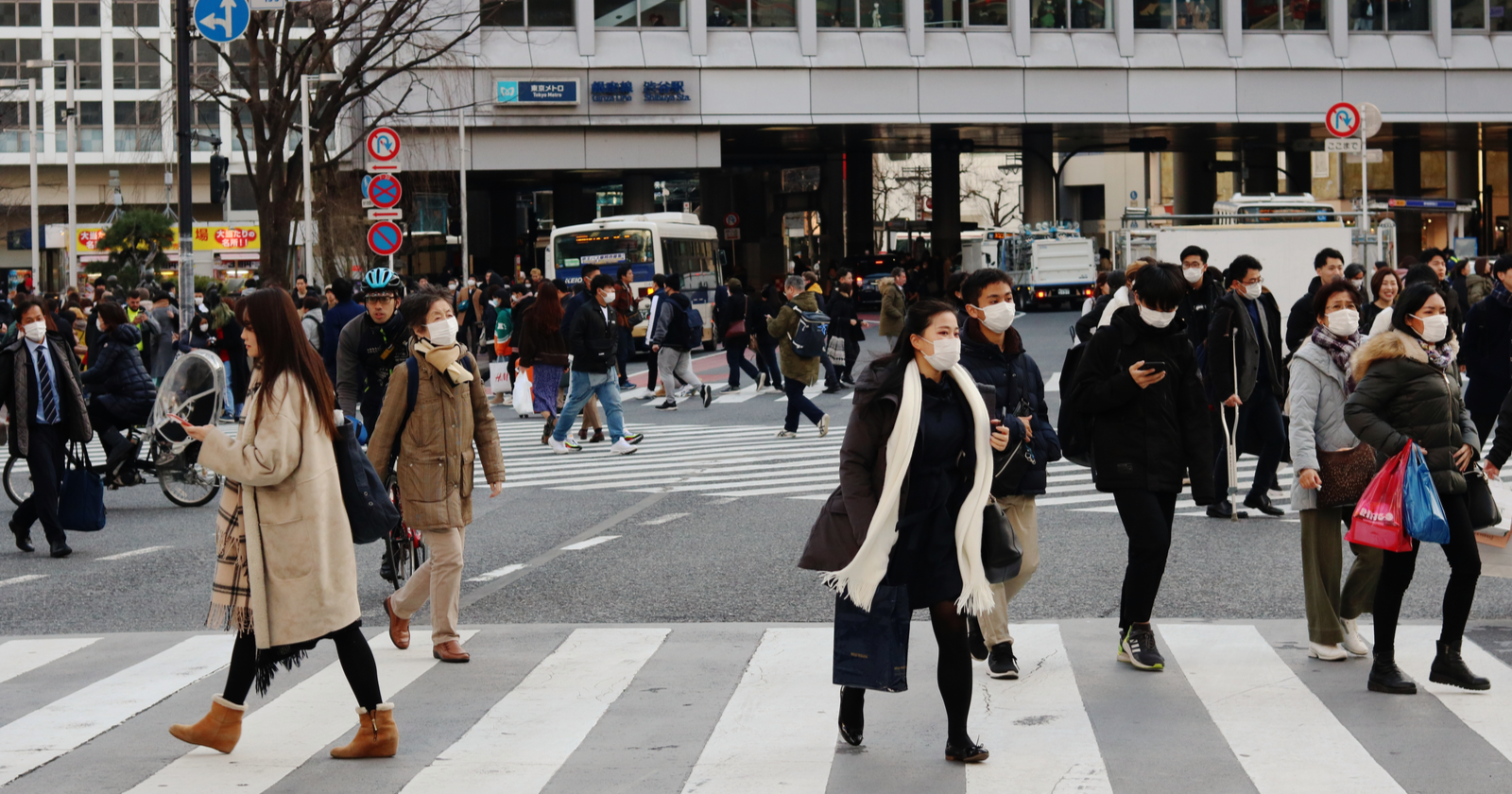



![AI Overviews: We Reverse-Engineered Them So You Don't Have To [+ What You Need To Do Next]](https://www.searchenginejournal.com/wp-content/uploads/2025/04/sidebar1x-455.png)